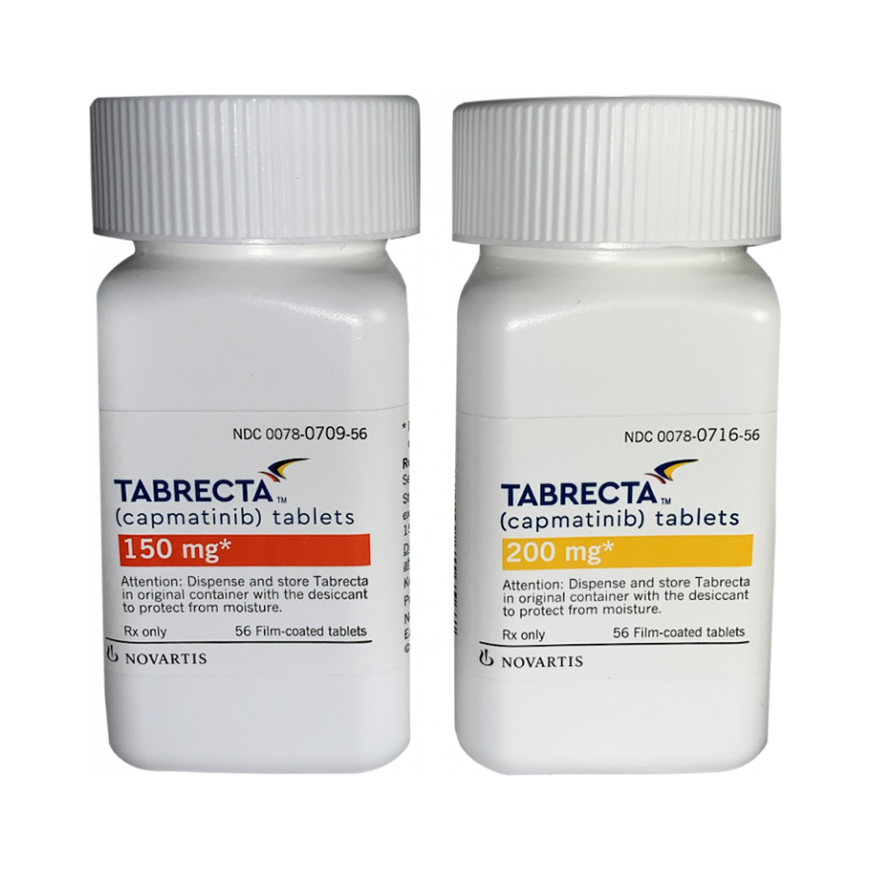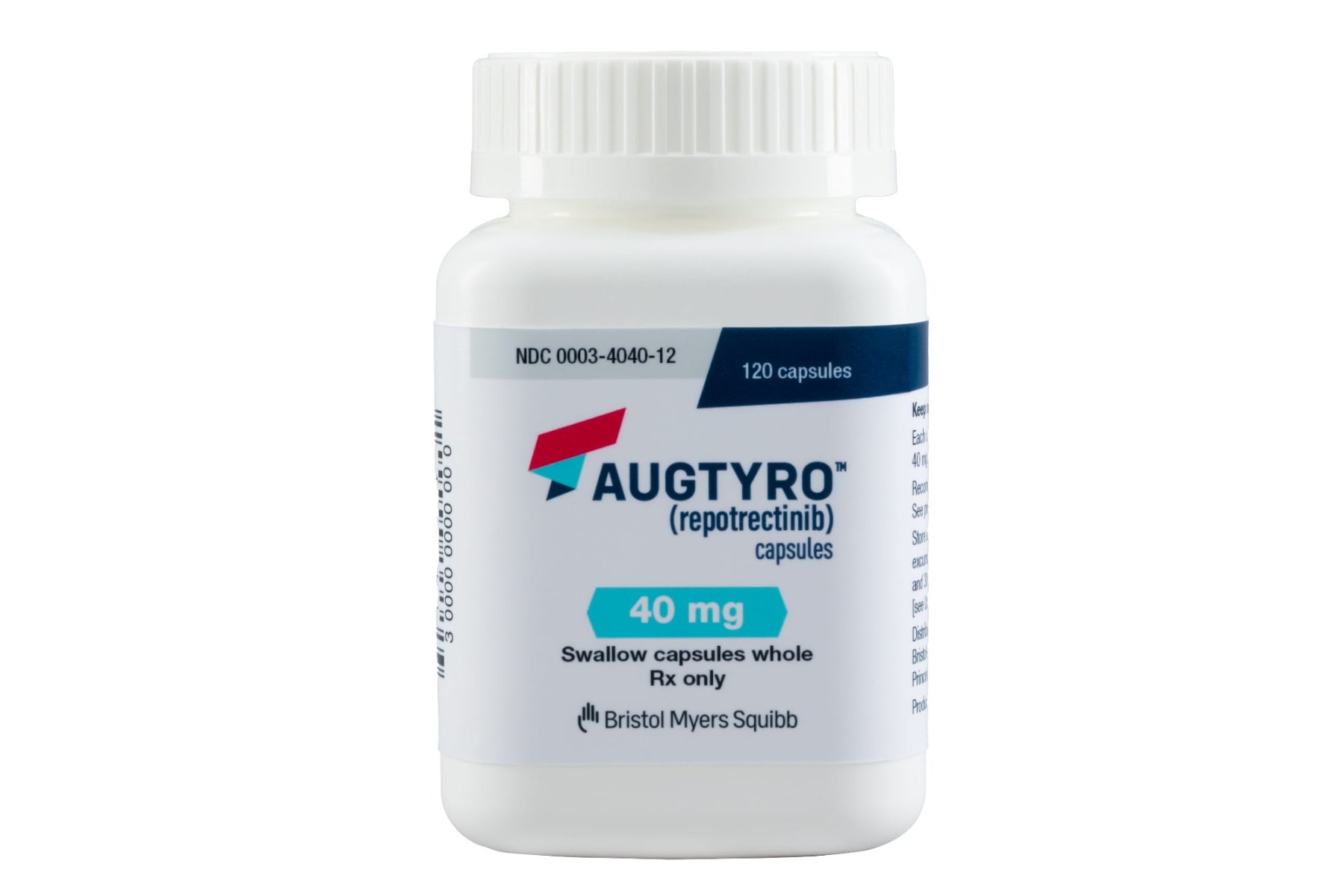Tabrecta (capmatinib) vs Augtyro (repotrectinib)
Tabrecta (capmatinib) vs Augtyro (repotrectinib)
Tabrecta (capmatinib) is a targeted therapy specifically approved for the treatment of adult patients with non-small cell lung cancer (NSCLC) that has a mutation leading to MET exon 14 skipping, offering a personalized treatment option for this genetic alteration. Augtyro (repotrectinib), on the other hand, is designed to target cancers with NTRK (neurotrophic tyrosine receptor kinase) gene fusions, ROS1 or ALK (anaplastic lymphoma kinase) positive tumors, providing a broad range of action for tumors with these specific genetic drivers. When deciding between Tabrecta and Augtyro, it is crucial for a patient to undergo molecular testing to determine the specific genetic alterations present in their tumor, as this will guide the choice of therapy to ensure the most effective and personalized treatment approach.
Difference between Tabrecta and Augtyro
| Metric | Tabrecta (capmatinib) | Augtyro (repotrectinib) |
|---|---|---|
| Generic name | Capmatinib | Repotrectinib |
| Indications | Non-small cell lung cancer (NSCLC) with MET exon 14 skipping mutations | Advanced solid tumors with ALK, ROS1, or NTRK1-3 rearrangements |
| Mechanism of action | MET inhibitor | ALK, ROS1, and TRK inhibitor |
| Brand names | Tabrecta | Augtyro |
| Administrative route | Oral | Oral |
| Side effects | Peripheral edema, nausea, fatigue, vomiting, dyspnea, decreased appetite | Not fully established; may include fatigue, constipation, dysgeusia, edema |
| Contraindications | Hypersensitivity to capmatinib or any of the excipients | Hypersensitivity to repotrectinib or any of the excipients |
| Drug class | Tyrosine kinase inhibitor | Tyrosine kinase inhibitor |
| Manufacturer | Novartis Pharmaceuticals Corporation | Turning Point Therapeutics, Inc. |
Efficacy
Overview of Tabrecta (capmatinib) Efficacy in Lung Cancer
Tabrecta (capmatinib) is a targeted therapy approved by the U.S. Food and Drug Administration (FDA) for the treatment of adult patients with non-small cell lung cancer (NSCLC) that has metastasized. It is specifically indicated for patients whose tumors have a mutation that leads to mesenchymal-epithelial transition (MET) exon 14 skipping, as detected by an FDA-approved test. The efficacy of Tabrecta was demonstrated in a clinical trial where patients with this specific genetic marker showed a significant response to the treatment. The overall response rate (ORR) was observed to be around 68% for previously untreated patients and about 41% for those who had received prior treatment, showcasing its potential as a first-line or subsequent therapy for MET exon 14 skipping NSCLC.
Efficacy of Augtyro (repotrectinib) in Lung Cancer
Augtyro (repotrectinib) is an investigational, next-generation tyrosine kinase inhibitor (TKI) designed to target ROS1 and NTRK1-3 rearrangements, which can be drivers in NSCLC. Although not yet approved by the FDA, early clinical trial data have shown promise for its use in treating ROS1-positive NSCLC. Patients with ROS1 fusion-positive lung cancer have demonstrated a preliminary efficacy response, with a focus on those who have developed resistance to prior ROS1 TKIs or are treatment-naive. The data suggest that repotrectinib has the potential to provide a new treatment option for this subset of lung cancer patients, pending further clinical trials and regulatory review.
Comparative Efficacy in Lung Cancer Treatment
When comparing the efficacy of Tabrecta and Augtyro, it is important to note that they target different genetic alterations in lung cancer. Tabrecta is an approved treatment for NSCLC with MET exon 14 skipping mutations, while Augtyro is being studied for its efficacy in NSCLC with ROS1 or NTRK rearrangements. The efficacy of each medication is highly dependent on the presence of their respective genetic targets within the tumor. Therefore, the selection of either Tabrecta or Augtyro as a treatment option would be based on the specific genetic profile of the patient's lung cancer.
Conclusion on the Efficacy of Tabrecta and Augtyro
Both Tabrecta and Augtyro represent advances in the personalized treatment of lung cancer, with each showing efficacy in targeting specific genetic alterations. Tabrecta has established its role in treating MET exon 14 skipping NSCLC, offering hope to patients with this mutation. Augtyro, although still under investigation, shows potential as a future treatment option for patients with ROS1 or NTRK rearranged NSCLC. As research continues, these targeted therapies could significantly impact the management of lung cancer, improving outcomes for patients with these specific genetic profiles.
Regulatory Agency Approvals
Tabrecta
-
European Medical Agency (EMA), European Union

-
Food and Drug Administration (FDA), USA

-
Pharmaceuticals and Medical Devices Agency (PMDA), Japan

Augtyro
-
Food and Drug Administration (FDA), USA

Access Tabrecta or Augtyro today
If Tabrecta or Augtyro are not approved or available in your country (e.g. due to supply issues), you can access them via Everyone.org.
How it works

Make an enquiry
Choose the medicine you want to buy, answer a couple of questions, and upload your prescription to speed things up. We’ll get back to you within 24 hours.


Make an enquiry
Choose the medicine you want to buy, answer a couple of questions, and upload your prescription to speed things up. We’ll get back to you within 24 hours.


Breeze through the paperwork
We'll guide you through the required documents for importing unapproved medicine, ensuring you have all the necessary information.


Get a personalized quote
We’ll prepare a quote for you, including medicine costs and any shipping, administrative, or import fees that may apply.


Receive your medicine
Accept the quote and we’ll handle the rest - sourcing and safely delivering your medicine.

Some text on this page has been automatically generated. Speak to your physician before you start a new treatment or medication.
Let's talk
If you have any questions, call us or send us a message through WhatsApp or email:
Contact us




